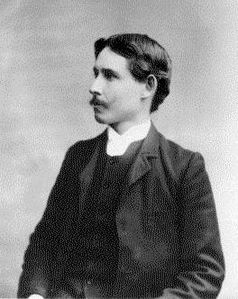Comfort of the Fields
Archibald Lampman 1861 (Upper Canada) – 1899 (Ottawa, Canada)
What would'st thou have for easement after grief,
When the rude world hath used thee with despite,
And care sits at thine elbow day and night,
Filching thy pleasures like a subtle thief?
To me, when life besets me in such wise,
'Tis sweetest to break forth, to drop the chain,
And grasp the freedom of this pleasant earth,
To roam in idleness and sober mirth,
Through summer airs and summer lands, and drain
The comfort of wide fields unto tired eyes.
By hills and waters, farms and solitudes,
To wander by the day with wilful feet;
Through fielded valleys wide with yellowing wheat;
Along gray roads that run between deep woods,
Murmurous and cool; through hallowed slopes of pine,
Where the long daylight dreams, unpierced, unstirred,
And only the rich-throated thrush is heard;
By lonely forest brooks that froth and shine
In bouldered crannies buried in the hills;
By broken beeches tangled with wild vine,
And long-strewn rivers murmurous with mills.
In upland pastures, sown with gold, and sweet
With the keen perfume of the ripening grass,
Where wings of birds and filmy shadows pass,
Spread thick as stars with shining marguerite:
To haunt old fences overgrown with brier,
Muffled in vines, and hawthorns, and wild cherries,
Rank poisonous ivies, red-bunched elder-berries,
And pièd blossoms to the heart's desire,
Gray mullein towering into yellow bloom,
Pink-tasseled milkweed, breathing dense perfume,
And swarthy vervain, tipped with violet fire.
To hear at eve the bleating of far flocks,
The mud-hen's whistle from the marsh at morn;
To skirt with deafened ears and brain o'erborne
Some foam-filled rapid charging down its rocks
With iron roar of waters; far away
Across wide-reeded meres, pensive with noon,
To hear the querulous outcry of the loon;
To lie among deep rocks, and watch all day
On liquid heights the snowy clouds melt by;
Or hear from wood-capped mountain-brows the jay
Pierce the bright morning with his jibing cry.
To feast on summer sounds; the jolted wains,
The thresher humming from the farm near by,
The prattling cricket's intermittent cry,
The locust's rattle from the sultry lanes;
Or in the shadow of some oaken spray,
To watch, as through a mist of light and dreams,
The far-off hayfields, where the dusty teams
Drive round and round the lessening squares of hay,
And hear upon the wind, now loud, now low,
With drowsy cadence half a summer's day,
The clatter of the reapers come and go.
Far violet hills, horizons filmed with showers,
The murmur of cool streams, the forest's gloom,
The voices of the breathing grass, the hum
Of ancient gardens overbanked with flowers:
Thus, with a smile as golden as the dawn,
And cool fair fingers radiantly divine,
The mighty mother brings us in her hand,
For all tired eyes and foreheads pinched and wan,
Her restful cup, her beaker of bright wine:
Drink, and be filled, and ye shall understand!
Font size:
Submitted on May 13, 2011
Modified on March 05, 2023
- 2:28 min read
- 105 Views
Quick analysis:
| Scheme | ABBACDEEDC CFFXGBXGHGH FIIFJKKJLLJ MXDMNOONPNP CPPXNQQNRNR SLXSXGTXGT |
|---|---|
| Closest metre | Iambic pentameter |
| Characters | 3,027 |
| Words | 488 |
| Stanzas | 6 |
| Stanza Lengths | 10, 11, 11, 11, 11, 10 |
Translation
Find a translation for this poem in other languages:
Select another language:
- - Select -
- 简体中文 (Chinese - Simplified)
- 繁體中文 (Chinese - Traditional)
- Español (Spanish)
- Esperanto (Esperanto)
- 日本語 (Japanese)
- Português (Portuguese)
- Deutsch (German)
- العربية (Arabic)
- Français (French)
- Русский (Russian)
- ಕನ್ನಡ (Kannada)
- 한국어 (Korean)
- עברית (Hebrew)
- Gaeilge (Irish)
- Українська (Ukrainian)
- اردو (Urdu)
- Magyar (Hungarian)
- मानक हिन्दी (Hindi)
- Indonesia (Indonesian)
- Italiano (Italian)
- தமிழ் (Tamil)
- Türkçe (Turkish)
- తెలుగు (Telugu)
- ภาษาไทย (Thai)
- Tiếng Việt (Vietnamese)
- Čeština (Czech)
- Polski (Polish)
- Bahasa Indonesia (Indonesian)
- Românește (Romanian)
- Nederlands (Dutch)
- Ελληνικά (Greek)
- Latinum (Latin)
- Svenska (Swedish)
- Dansk (Danish)
- Suomi (Finnish)
- فارسی (Persian)
- ייִדיש (Yiddish)
- հայերեն (Armenian)
- Norsk (Norwegian)
- English (English)
Citation
Use the citation below to add this poem to your bibliography:
Style:MLAChicagoAPA
"Comfort of the Fields" Poetry.com. STANDS4 LLC, 2024. Web. 18 Apr. 2024. <https://www.poetry.com/poem/3625/comfort-of-the-fields>.



Discuss the poem Comfort of the Fields with the community...
Report Comment
We're doing our best to make sure our content is useful, accurate and safe.
If by any chance you spot an inappropriate comment while navigating through our website please use this form to let us know, and we'll take care of it shortly.
Attachment
You need to be logged in to favorite.
Log In